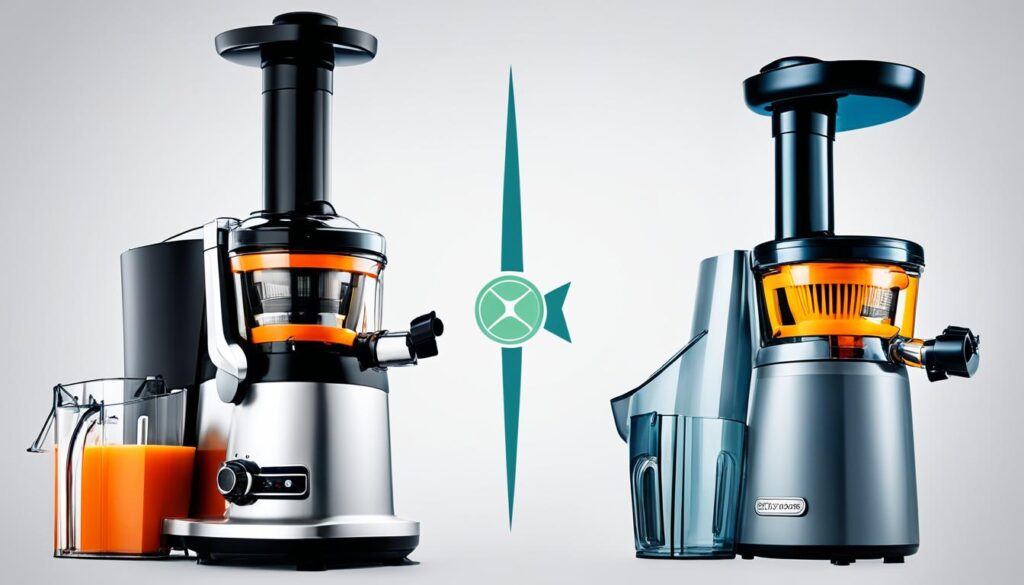
Welcome to my guide on centrifugal and masticating juicers! If you’re interested in juicing and are looking to make an informed decision about the right type of juicer for you, you’ve come to the right place. In this guide, I’ll explain the differences between centrifugal and masticating juicers, their pros and cons, and factors to consider when buying a juicer. Let’s dive in!
Centrifugal juicers and masticating juicers are two common types of electric, countertop juicers. Centrifugal juicers use high-speed spinning blades to grind fruits and vegetables into pulp, while masticating juicers use a slower rotating auger to crush and press produce, resulting in thicker and fresher-tasting juices.
Centrifugal juicers are faster and more affordable, but masticating juicers yield more juice and are quieter. Both types have pros and cons, depending on individual juicing needs and preferences.
Key Takeaways:
- Centrifugal juicers use high-speed spinning blades, while masticating juicers use a slow rotating auger.
- Centrifugal juicers are faster and more affordable, but masticating juicers yield more juice and are quieter.
- Consider factors like juicing needs, noise level, and price when selecting a juicer.
- Regular cleaning and maintenance are crucial for optimal juicer performance.
- Consult a healthcare professional for specific dietary concerns or health conditions.
What are Centrifugal Juicers?
Centrifugal juicers, also known as high-speed juicers, are a popular type of electric countertop juicers. These juicers operate by using a high-speed spinning blade to shred fruits and vegetables into pulp.
Once the produce is shredded, the centrifugal force created by the blade separates the juice from the pulp. The juice is then filtered out through a spout, ready to be enjoyed.
Centrifugal juicers are fast and convenient, making them ideal for those who want quick and efficient juicing. They are especially suitable for juicing hard produce like beets and carrots.
However, there are a few downsides to centrifugal juicers. Due to the high-speed processing, these juicers tend to produce thinner juice compared to other types. Additionally, the high-speed spinning can lead to some nutrient loss, resulting in less nutrient retention in the juice.
Another factor to consider is the noise level. Centrifugal juicers can be quite loud during operation, which may be a drawback for those seeking a quieter juicing experience.
To summarize, centrifugal juicers offer speed and convenience, making them a popular choice for many juicing enthusiasts. They are best suited for those who prioritize quick results and want to juice hard produce efficiently.
What are Masticating Juicers?
Masticating juicers, also known as slow juicers or slow-press juicers, operate at a slower speed compared to centrifugal juicers. They use a rotating auger or gears to crush and press fruits and vegetables, extracting juice with less oxidation and foam. Masticating juicers yield thicker juice with higher nutrient content and longer shelf life. They are quieter and better for juicing leafy greens and soft produce. However, they are generally more expensive, require more prep work, and have more components to clean.
The Benefits of Masticating Juicers:
- Thicker juice: Masticating juicers extract juice that is denser and creamier in texture, resulting in a more satisfying drinking experience.
- Higher nutrient content: The slow juicing process of masticating juicers minimizes heat and oxidation, preserving more essential nutrients and enzymes in the juice.
- Longer shelf life: Due to the slower extraction process, masticating juicers produce juice that can be stored for longer periods without significant degradation in quality.
- Quiet operation: Masticating juicers operate at a lower speed, resulting in reduced noise levels compared to high-speed centrifugal juicers.
- Leafy greens and soft produce: Masticating juicers are highly effective at extracting juice from delicate ingredients like spinach, kale, and wheatgrass.
The Drawbacks of Masticating Juicers:
- Higher cost: Masticating juicers tend to be more expensive than centrifugal juicers due to their advanced technology and slower juicing process.
- Prep work: Masticating juicers typically require produce to be cut into smaller pieces before juicing, adding some extra preparation time.
- More components to clean: Masticating juicers have multiple parts, including augers and screens, which need to be thoroughly cleaned after each use.
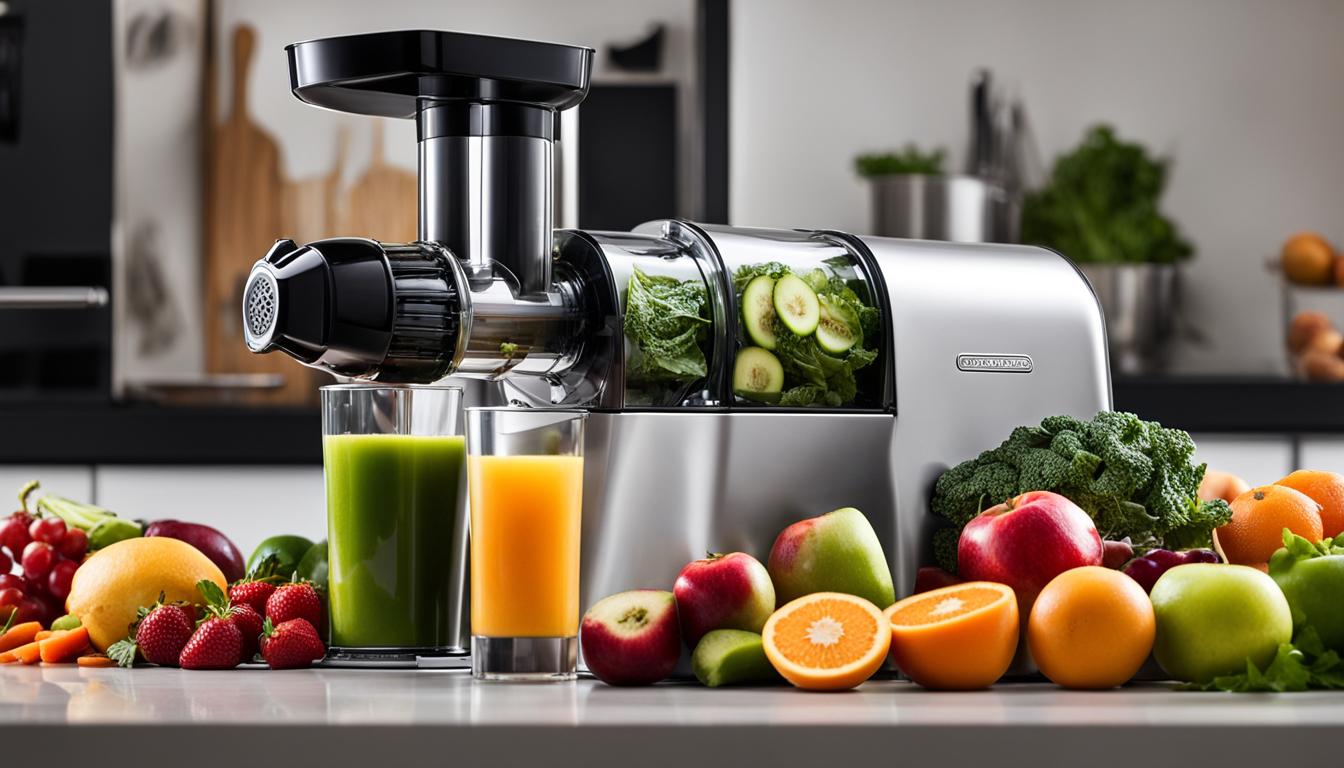
Pros and Cons of Centrifugal Juicers
Centrifugal juicers offer several advantages that make them a popular choice among juicing enthusiasts. However, they also come with a few drawbacks to consider. Let’s take a closer look at the pros and cons of centrifugal juicers.
Advantages of Centrifugal Juicers
“Centrifugal juicers are better for juicing hard produce, are fast and convenient, and often more affordable.”
When it comes to juicing hard fruits and vegetables like apples, carrots, or beets, centrifugal juicers are highly efficient. Their powerful motors and high-speed spinning blades make quick work of these produce, extracting juice effortlessly.
The speed at which centrifugal juicers operate also makes them incredibly convenient. If you’re someone who values efficiency and wants to enjoy a glass of fresh juice in no time, a centrifugal juicer is a great option.
Additionally, centrifugal juicers are often more affordable compared to masticating juicers. If you’re on a budget or just starting your juicing journey, a centrifugal juicer might be the more cost-effective choice.
Some other notable advantages of centrifugal juicers include:
- Less prep work required
- Smaller countertop footprint
With centrifugal juicers, you’ll spend less time chopping or cutting fruits and vegetables into smaller pieces. Their wide feed chutes can accommodate larger chunks, reducing prep time and effort.
Moreover, centrifugal juicers typically have a more compact design, making them ideal for kitchens with limited counter space.
Disadvantages of Centrifugal Juicers
“Centrifugal juicers tend to produce less nutritious juice with more foam and separation. They can be noisy and have shorter warranty coverage.”
Despite their benefits, centrifugal juicers have a few drawbacks that may impact your juicing experience. One common concern is the quality of the juice produced. Due to the high-speed spinning blades, centrifugal juicers tend to introduce more air into the juice, resulting in increased oxidation and foam.
This can lead to a loss of nutrients and a shorter shelf life for the juice. If you prioritize maximum nutrient retention and longer-lasting juice, a masticating juicer might be a better choice.
Another drawback of centrifugal juicers is their noise level. The powerful motors required to operate the high-speed spinning blades can generate significant noise. If you’re sensitive to noise or live with others who are, it’s worth considering a quieter alternative like a masticating juicer.
Lastly, warranty coverage for centrifugal juicers is often shorter compared to masticating juicers. It’s important to check the manufacturer’s warranty before making a purchase to ensure you’re covered in case of any issues.
Pros and Cons of Centrifugal Juicers at a Glance
| Advantages | Disadvantages |
|---|---|
| Benefits | Drawbacks |
|
|
Pros and Cons of Masticating Juicers
Masticating juicers, also known as slow juicers or slow-press juicers, offer numerous advantages over centrifugal juicers. These juicers use a slower rotating auger to crush and press fruits and vegetables, resulting in thicker, more flavorful juice with higher nutrient content and longer shelf life.
One of the key benefits of masticating juicers is their ability to handle leafy greens and soft produce effectively. The slow and gentle squeezing action ensures maximum juice extraction, making them ideal for juicing ingredients like spinach, kale, and wheatgrass.
“With every sip, you can enjoy the full flavor and goodness of the ingredients.”
In addition to superior juicing performance, masticating juicers are also quieter compared to their centrifugal counterparts. The slow rotation of the auger minimizes noise, allowing you to enjoy the juicing process without disturbing others in your household or neighborhood.
However, it’s important to note that masticating juicers do have some drawbacks. Firstly, they tend to be more expensive than centrifugal juicers, making them less accessible to budget-conscious buyers. Additionally, the slower juicing speed means that masticating juicers require more time to extract juice, which may not be ideal for those seeking quick and efficient juicing.
“Investing in a masticating juicer requires patience, but the results are worth it.”
Furthermore, masticating juicers typically have more components to clean compared to centrifugal juicers. The auger, strainer, and other parts may need careful disassembly and cleaning after each use. This added complexity in maintenance can be a hassle for busy individuals or those who prefer a simpler cleaning process.
Lastly, masticating juicers may take up more countertop space due to their larger size and bulkier design. If you have limited kitchen space, you may need to carefully consider the dimensions of a masticating juicer to ensure it fits comfortably in your designated juicing area.
To summarize, masticating juicers offer a range of benefits such as thicker, more nutritious juice, and quiet operation. However, they come with trade-offs such as a higher price point, slower juicing speed, more complex cleaning, and larger size. It’s important to weigh these pros and cons to determine if a masticating juicer is the right fit for your juicing needs and preferences.
Pros and Cons of Masticating Juicers:
| Pros of Masticating Juicers | Cons of Masticating Juicers |
|---|---|
| Thicker, more flavorful juice | Higher price point |
| Higher nutrient content | Slower juicing speed |
| Longer shelf life | More complex cleaning |
| Effective for leafy greens and soft produce | Larger size occupies more countertop space |
Factors to Consider When Buying a Juicer
When it comes to purchasing a juicer, there are several important factors to consider. Taking these factors into account will ensure that you choose the right juicer that meets your needs and preferences. Below, I have outlined the key considerations that should guide your decision-making process.
1. Size
The size of the juicer is an important factor to consider, as it should align with your household needs. If you have a smaller kitchen or limited countertop space, opting for a compact and space-saving juicer would be ideal. On the other hand, if you anticipate juicing large quantities of produce or have a larger family, it’s important to choose a juicer with a larger capacity to accommodate your needs.
2. Power
Power plays a crucial role in the juicing process. Look for a juicer with a powerful motor that can handle a variety of fruits and vegetables. It’s also beneficial to choose a juicer with variable speeds, allowing you to adjust the power based on the texture and juiciness of different produce. This versatility ensures consistent juicing results.
3. Noise Level
Noise level is a consideration, especially if you live in a household where noise is a concern. Some juicers operate at a higher volume, which can be disruptive, particularly in the morning or late at night. Choosing a juicer with a quieter motor will allow you to juice without disturbing others or impacting your own peace of mind.
4. Ease of Cleaning
Cleaning a juicer can be a tedious task, so opting for a juicer that is easy to clean will save you time and effort. Look for juicers with dishwasher-safe parts for added convenience. Investing in a juicer with removable components that are easy to access and clean will ensure that you can maintain your juicer’s hygiene with ease.
5. Price
There is a wide range of juicer prices available in the market, so it’s important to set a budget and find a juicer that fits within your price range. Consider what features and specifications are essential for your juicing needs, and make a decision based on the value the juicer provides. Remember, a higher price doesn’t always guarantee a better juicer, so consider your budget alongside other factors.
By carefully evaluating these factors, you can confidently select a juicer that aligns with your specific needs, preferences, and budget.
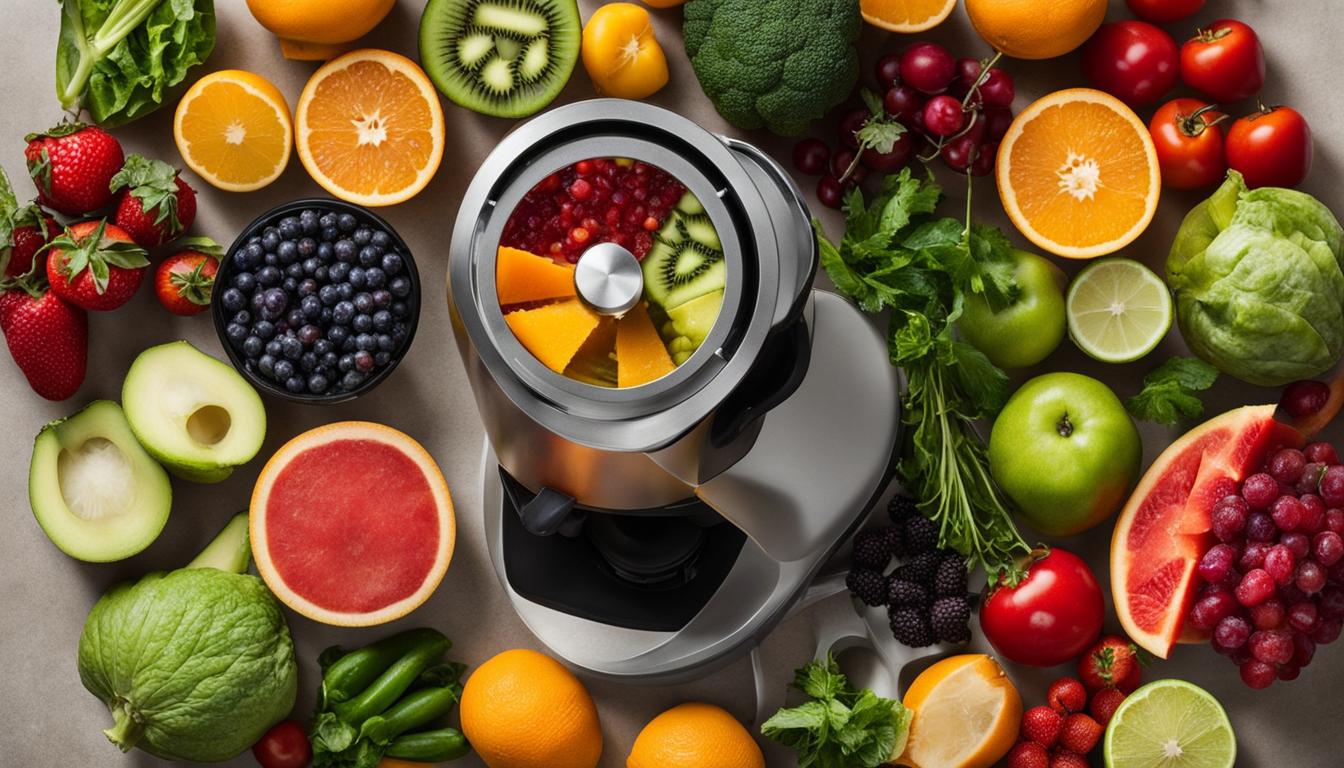
| Factors to Consider | Importance |
|---|---|
| Size | High |
| Power | High |
| Noise Level | Medium |
| Ease of Cleaning | High |
| Price | Medium |
Tips for Cleaning Juicers
Cleaning your juicer regularly is essential to ensure its optimal performance and longevity. Follow these juicer cleaning tips to maintain a clean and efficient juicing experience.
1. Unplug and Disassemble:
To clean a juicer, start by unplugging it from the power source and carefully disassembling all the removable parts.
2. Clean Components Separately:
Wash each juicer component separately with warm soapy water, ensuring thorough cleaning of all surfaces.
3. Follow Manufacturer’s Instructions:
Refer to the manufacturer’s instructions for specific cleaning guidelines, as different juicer models may have different cleaning requirements.
4. Pay Attention to Hard-to-Reach Areas:
Use a brush or cloth to clean hard-to-reach areas, such as crevices and corners, ensuring the removal of any residue or buildup.
5. Dishwasher-Safe Parts:
Check if your juicer has any dishwasher-safe parts. If so, place them in the dishwasher for convenient cleaning.
6. Regular Cleaning and Maintenance:
Make it a habit to clean your juicer after each use, promoting hygiene and preventing the accumulation of pulp and debris over time.
Remember, a clean juicer not only ensures the quality of your juice but also extends the lifespan of your appliance.
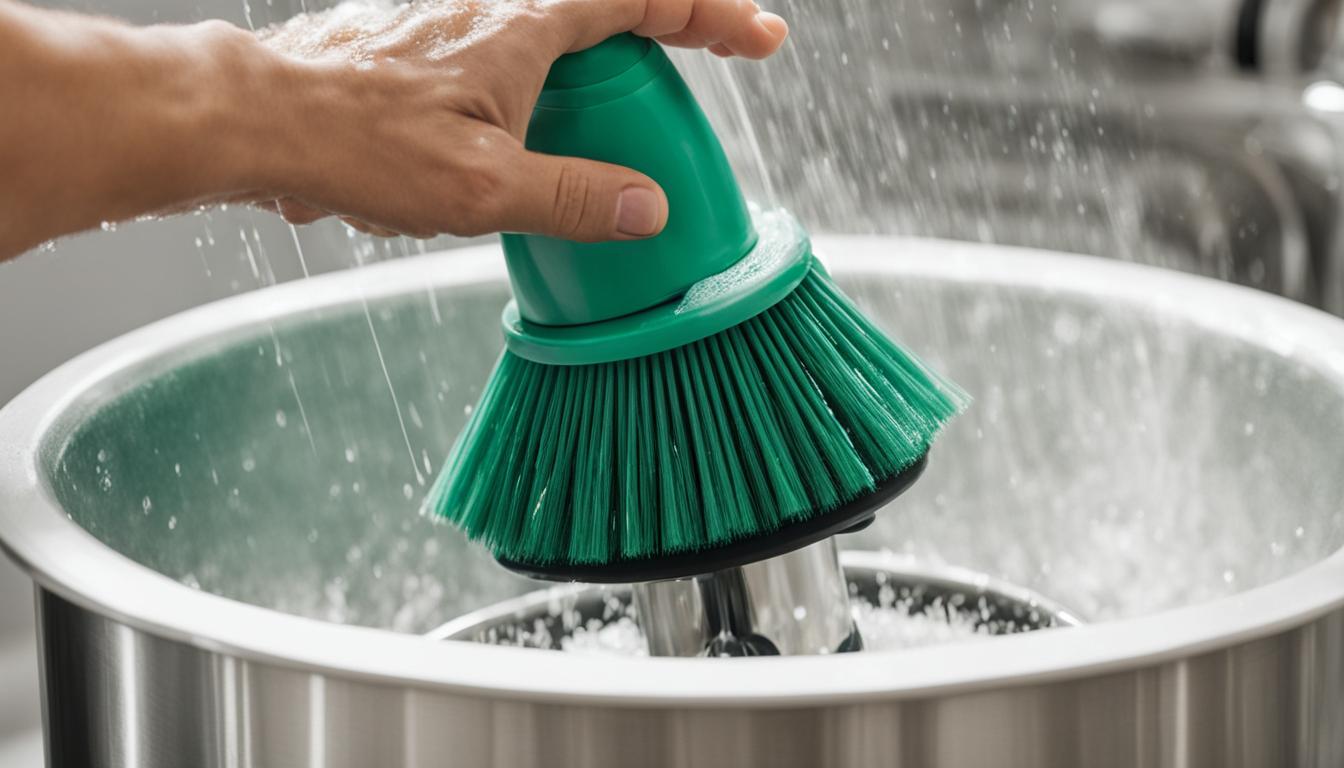
Juicing Tips and Precautions
When it comes to juicing, there are a few tips and precautions to keep in mind for a safe and enjoyable experience. Here are some important points to consider:
Mindful Produce Selection
When selecting produce for juicing, it’s important to be mindful of the quality and suitability of the fruits and vegetables. Avoid juicing any produce that you wouldn’t eat raw. This ensures that you are using fresh and safe ingredients for your juice.
It’s worth noting that certain fruits and vegetables have naturally low water content, such as bananas or avocados. These may not yield much juice when juiced alone, so consider combining them with other high-water content produce to get the desired juice volume.
Thoroughly Clean Produce
Prior to juicing, it’s essential to thoroughly clean your fruits and vegetables to remove any dirt, pesticides, or contaminants. Washing them under running water and gently scrubbing with a brush can help eliminate any residue or impurities.
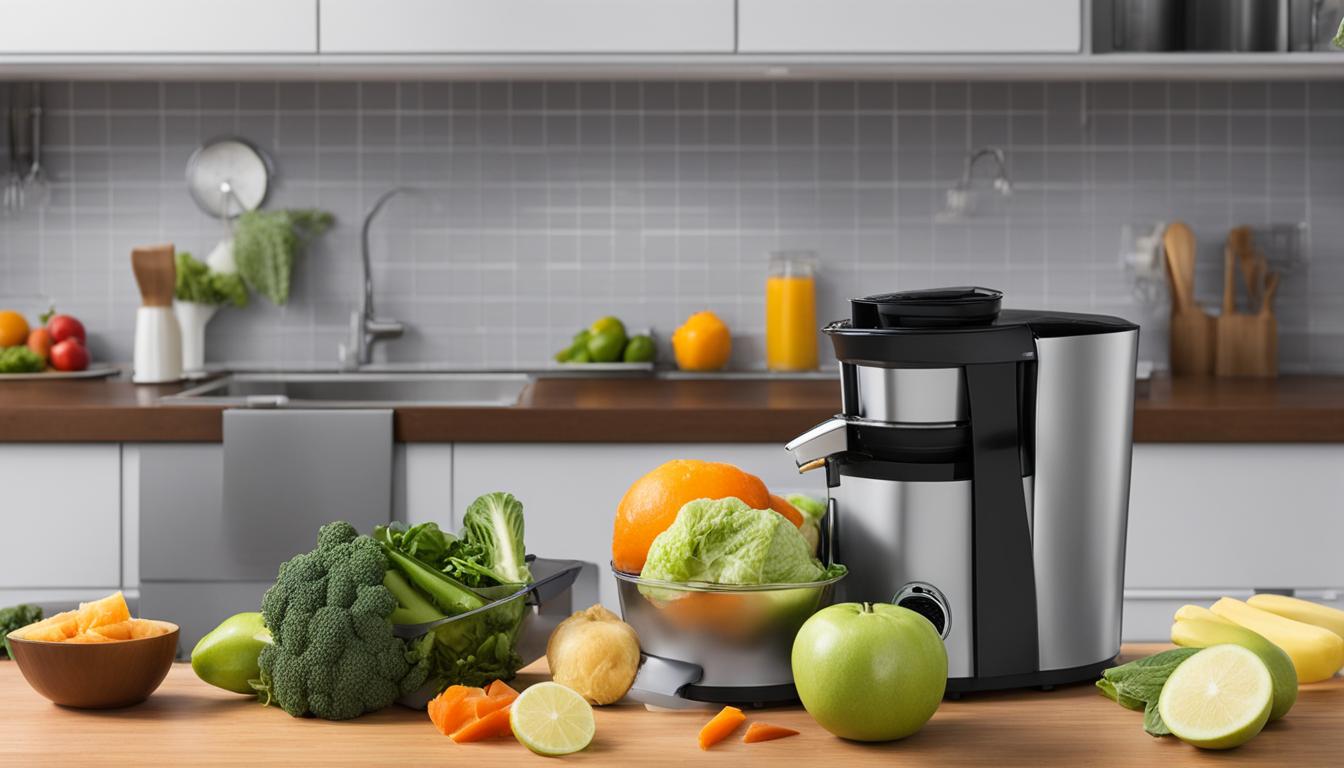
Importance of Fiber
When you juice fruits and vegetables, the fiber content is removed, leaving behind only the liquid and nutrients. While fresh juices can be a nutritious addition to a balanced diet, it’s crucial to remember that whole produce contains essential dietary fiber. Incorporate whole fruits and vegetables into your meals and snacks to ensure adequate fiber intake.
Consult a Healthcare Professional
If you have specific dietary concerns or underlying health conditions, it’s recommended to consult a healthcare professional before embarking on a juicing regimen. They can provide personalized advice based on your individual needs and help you make informed decisions about incorporating juicing into your diet.
Conclusion
After comparing the features and benefits of centrifugal juicers and masticating juicers, it is clear that the choice between the two depends on individual preferences and juicing goals.
Centrifugal juicers are a great option for those who prioritize speed and affordability. They are ideal for juicing hard produce like carrots and beets, delivering quick results in a convenient manner. However, it’s important to note that centrifugal juicers may produce juice with less nutrient retention and more separation. They can also be noisy and may have shorter warranty coverage.
Masticating juicers, on the other hand, offer higher-quality juice with longer shelf life. They are preferred by serious juice drinkers who want to maximize nutrient retention and enjoy thicker, more flavorful juice. Masticating juicers excel at processing leafy greens and soft produce, providing optimal juice yield and nutritional value.
When selecting a juicer, consider important factors such as speed, juice yield, juice quality, ease of use, and price. Each of these elements plays a role in determining which juicer is the best fit for your needs and preferences.
Regular cleaning and maintenance are crucial for ensuring optimal juicer performance. Properly cleaning your juicer after each use will help maintain its functionality and longevity.
Ultimately, whether you choose a centrifugal or masticating juicer, investing in a juicer will bring a new level of freshness and nutrition to your daily routine.
Final Thoughts on Juicers
When it comes to juicing, there is no one-size-fits-all solution. The choice between a centrifugal and masticating juicer depends on your juicing goals, preferences, and budget. By considering factors such as speed, juice yield, juice quality, ease of use, and price, you can make an informed decision that aligns with your individual needs.
Remember, whether you’re looking for quick and convenient juicing or seeking to maximize nutrient retention, both centrifugal and masticating juicers have their own advantages. What matters most is that you find a juicer that fits seamlessly into your lifestyle and helps you achieve your desired juicing results.
With the right juicer by your side and a variety of fresh produce at hand, you’ll be on your way to enjoying delicious and nutritious homemade juices anytime.
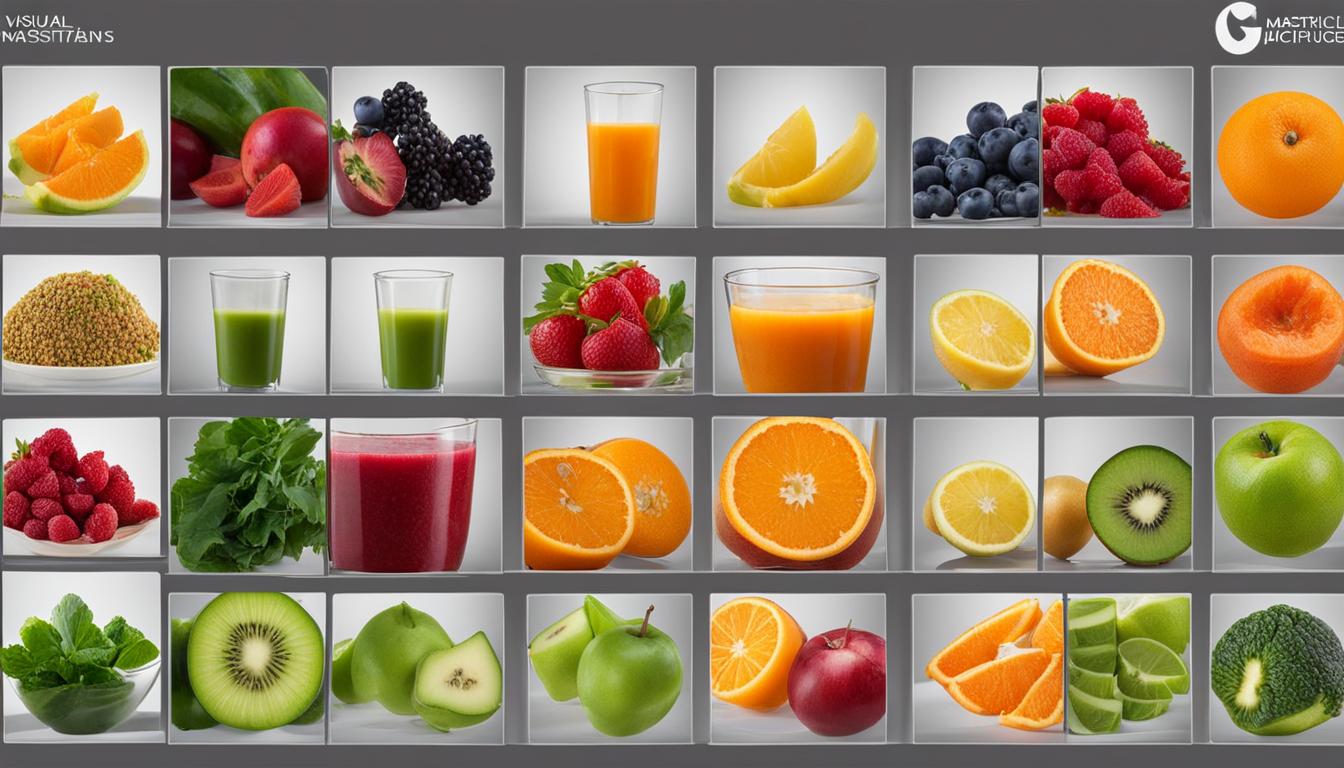
Additional Keywords
When researching for the best juicers, it’s essential to consider different juicer types, compare their features, and read juicer reviews. This comprehensive guide aims to assist you in finding the perfect juicer by providing a detailed juicer comparison. Whether you’re looking for a juicer for personal use or professional purposes, understanding the various types and their unique features is crucial.
By exploring the pros and cons of different juicer models, you can narrow down your options and determine which one suits your needs. Juicer reviews from experts and customers can also provide valuable insights and recommendations.
Below, I have included a table summarizing the key features and specifications of the top-rated juicers in the market. This table offers a quick overview of the best juicers available, helping you make an informed decision:
| Model | Type | Motor Power | Speed Options | Price Range | Customer Rating |
|---|---|---|---|---|---|
| Brand X | Centrifugal | 800W | 2 | $100 – $150 | 4.5/5 |
| Brand Y | Masticating | 150W | Variable | $250 – $350 | 4.8/5 |
| Brand Z | Centrifugal | 1200W | 3 | $200 – $250 | 4.6/5 |
This table illustrates the differences in juicer types, motor power, speed options, price range, and customer ratings. It serves as a valuable reference to help you further evaluate and compare the best juicers on the market.
Remember, finding the best juicer requires careful consideration of your juicing needs, preferences, and budget. By leveraging the power of juicer comparisons and reviews, you can make an informed decision and select a juicer that will meet your expectations.
Resource Article
Looking to buy a juicer but not sure which type is right for you? In this comprehensive guide, I will compare the two main types of juicers: centrifugal and masticating. Understanding their differences and advantages can help you make an informed decision.
Centrifugal juicers, like the popular Breville Juice Fountain, use high-speed spinning blades to quickly extract juice from fruits and vegetables. They are great for juicing hard produce like apples and carrots, and they are generally more affordable compared to masticating juicers.
On the other hand, masticating juicers, such as the Omega NC900HDC, operate at a slower speed and use a rotating auger to crush and press produce. This method results in thicker, more nutrient-rich juice and is perfect for leafy greens and soft fruits. Although masticating juicers are pricier, they offer higher juice quality and longer shelf life.
When buying a juicer, consider factors such as size, power, noise level, ease of cleaning, and price. Both centrifugal and masticating juicers have their pros and cons, so it’s important to choose based on your specific juicing needs and preferences. To learn more about juicers, from types and comparisons to reviews and buying guides, this resource article has you covered.
FAQ
What are the different types of juicers?
The two common types of juicers are centrifugal juicers and masticating juicers.
What are centrifugal juicers?
Centrifugal juicers use high-speed spinning blades to grind fruits and vegetables into pulp.
What are masticating juicers?
Masticating juicers, also known as slow juicers or slow-press juicers, use a slower rotating auger to crush and press produce.
What are the pros and cons of centrifugal juicers?
Centrifugal juicers are fast and convenient, but produce thinner juice with less nutrient retention and can be noisy.
What are the pros and cons of masticating juicers?
Masticating juicers yield thicker juice with higher nutrient content and longer shelf life, but are generally more expensive and slower.
What factors should I consider when buying a juicer?
Consider size, power, noise level, ease of cleaning, and price when purchasing a juicer.
How do I clean a juicer?
Start by unplugging and disassembling the juicer, clean each component separately with warm soapy water, and pay attention to harder-to-reach areas. Some parts may be dishwasher-safe.
What are some juicing tips and precautions?
Avoid juicing fruits or vegetables that you wouldn’t eat raw, clean your produce thoroughly, and remember that juicing removes fiber from fruits and vegetables.
What are the additional keywords relevant to juicers?
Keywords like best juicers, juicer types, juicer comparison, and juicer reviews are relevant when researching and comparing juicers.
Any final thoughts on juicers?
Choosing between centrifugal and masticating juicers depends on individual preferences and goals. Consider factors like speed, juice yield, quality, ease of use, and price.
Where can I find more information about juicers?
Check out our comprehensive resource article on types of juicers, centrifugal juicers, masticating juicers, best juicers, juicer types, juicer comparison, juicer reviews, and juicer buying guide.
